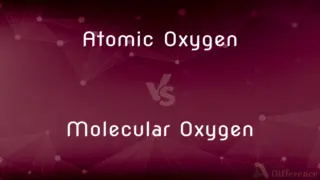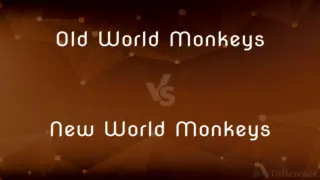Riot vs. Rebellion — What's the Difference?
By Tayyaba Rehman — Published on September 28, 2023
A Riot is a violent disturbance by a crowd, often spontaneous, while a Rebellion is an organized resistance against authority or control. Both involve conflict but differ in scope and intent.

Difference Between Riot and Rebellion
Table of Contents
ADVERTISEMENT
Key Differences
Both Riot and Rebellion signify forms of upheaval, but they operate at different scales and with different underlying motivations. A Riot often arises from spontaneous outbursts of violence or disorder by a group, usually in response to a particular incident.
Rebellion, on the other hand, signifies a broader, organized movement. It involves a conscious effort to challenge or overthrow an established authority or system. While a Riot can be seen as an isolated event, Rebellion indicates a sustained effort or campaign.
When assessing the causes behind a Riot and a Rebellion, one can observe distinct triggers. Riots typically stem from immediate grievances, be it social, economic, or political, erupting quickly and sometimes dissipating just as fast. In contrast, Rebellions are generally driven by deeper, systemic issues, seeking long-term change or autonomy.
It's important to note that while all Rebellions involve some form of resistance or dissent, not all are violent. However, the term Riot intrinsically suggests violence or chaos. Rebellions might be peaceful, rooted in civil disobedience, whereas Riots are inherently tumultuous.
In essence, while both Riot and Rebellion involve conflict and challenge to norms, Riot is a more immediate, often chaotic reaction, whereas Rebellion represents an organized and purposeful challenge to established order or authority.
ADVERTISEMENT
Comparison Chart
Nature
Spontaneous disturbance
Organized resistance
Scale
Often localized
Can be widespread
Duration
Typically short-lived
Can be prolonged
Underlying Cause
Immediate grievances
Deeper systemic issues
Intent
Immediate reaction, less strategic
Purposeful challenge to authority/system
Compare with Definitions
Riot
An uncontrolled outburst of emotions or actions.
The celebration turned into a Riot with fireworks and dancing.
Rebellion
An organized resistance against established authority.
The colonies staged a Rebellion against the empire.
Riot
A wild or turbulent disturbance created by a large number of people.
Rebellion
An act of defiance or challenge to the status quo.
The Rebellion was sparked by oppressive laws and policies.
Riot
(Law) A violent disturbance of the public peace by three or more persons assembled for a common purpose.
Rebellion
An uprising against a governing body or system.
The Rebellion lasted years, leading to significant political changes.
Riot
An unrestrained outbreak, as of laughter or passions.
Rebellion
A refusal to obey or accept norms or control.
The artist's work was seen as a Rebellion against traditional norms.
Riot
A profusion
The garden was a riot of colors in August.
Rebellion
A movement seeking to achieve change or autonomy.
The Rebellion aimed to establish a new independent state.
Riot
Unrestrained merrymaking; revelry.
Rebellion
Open, armed, and organized resistance to a constituted government.
Riot
Debauchery.
Rebellion
An instance of this.
Riot
(Slang) An irresistibly funny person or thing
Isn't she a riot?.
Rebellion
Defiance toward an authority or established convention
An act of adolescent rebellion.
Riot
To take part in a riot.
Rebellion
An instance of this.
Riot
To live wildly or engage in uncontrolled revelry.
Rebellion
(uncountable) Armed resistance to an established government or ruler.
The government is doing its best to stop rebellion in the country.
Riot
To waste (money or time) in wild or wanton living
"rioted his life out, and made an end" (Tennyson).
Rebellion
(countable) Defiance of authority or control; the act of rebelling.
Having a tattoo was Mathilda's personal rebellion against her parents.
Riot
A tumultuous disturbance of the public peace by a large group of people, often involving violence or damage to property.
The protests began peacefully but turned into riots after several days.
Rebellion
(countable) An organized, forceful subversion of the law of the land in an attempt to replace it with another form of government.
The army general led a successful rebellion and became president of the country.
Riot
(figurative) A wide and unconstrained variety.
In summer this flower garden is a riot of colour.
Rebellion
The act of rebelling; open and avowed renunciation of the authority of the government to which one owes obedience, and resistance to its officers and laws, either by levying war, or by aiding others to do so; an organized uprising of subjects for the purpose of coercing or overthrowing their lawful ruler or government by force; revolt; insurrection.
No sooner is the standard of rebellion displayed than men of desperate principles resort to it.
Riot
A humorous or entertaining event or person.
Rebellion
Open resistance to, or defiance of, lawful authority.
Riot
Wanton or unrestrained behavior or emotion.
Rebellion
Refusal to accept some authority or code or convention;
Each generation must have its own rebellion
His body was in rebellion against fatigue
Riot
(obsolete) Excessive and expensive feasting; wild and loose festivity; revelry.
Rebellion
Organized opposition to authority; a conflict in which one faction tries to wrest control from another
Riot
(intransitive) To create or take part in a riot; to raise an uproar or sedition.
The nuclear protesters rioted outside the military base.
Riot
To act in an unrestrained or wanton manner; to indulge in excess of feasting, luxury, etc.
Riot
(transitive) To cause to riot; to throw into a tumult.
Riot
(transitive) To annoy.
Riot
Wanton or unrestrained behavior; uproar; tumult.
His headstrong riot hath no curb.
Riot
Excessive and exxpensive feasting; wild and loose festivity; revelry.
Venus loveth riot and dispense.
The lamb thy riot dooms to bleed to-day.
Riot
The tumultuous disturbance of the public peace by an unlawful assembly of three or more persons in the execution of some private object.
Riot
To engage in riot; to act in an unrestrained or wanton manner; to indulge in excess of luxury, feasting, or the like; to revel; to run riot; to go to excess.
Now he exact of all, wastes in delight,Riots in pleasure, and neglects the law.
No pulse that riots, and no blood that glows.
Riot
To spend or pass in riot.
[He] had rioted his life out.
Riot
A public act of violence by an unruly mob
Riot
A state of disorder involving group violence
Riot
A joke that seems extremely funny
Riot
A wild gathering involving excessive drinking and promiscuity
Riot
Take part in a riot; disturb the public peace by engaging in a riot;
Students were rioting everywhere in 1968
Riot
Engage in boisterous, drunken merry-making;
They were out carousing last night
Riot
A violent disturbance caused by a group.
The city experienced a Riot after the controversial verdict.
Riot
Spontaneous and tumultuous public disorder.
The sudden power outage sparked a Riot in the neighborhood.
Riot
A chaotic or uproarious situation.
The stadium became a Riot when the team won unexpectedly.
Riot
Mass act of civil disobedience, often violent.
News channels broadcasted live coverage of the Riot downtown.
Common Curiosities
Is every Riot part of a Rebellion?
No, while some Riots can be part of a larger Rebellion, many occur independently.
Can a Rebellion be peaceful?
Yes, not all Rebellions involve violence; some are rooted in peaceful civil disobedience.
Is a Rebellion always against a government?
While many Rebellions target governments, they can also arise against any authoritative entity or system.
Do Riots always involve damage to property?
Often, but not always. The essence of a Riot is disorder, which can manifest in various ways.
What might a Rebellion seek to achieve?
Rebellions often seek systemic change, autonomy, or the overthrow of an existing order.
Can a Rebellion have political motives?
Yes, many Rebellions aim to change political systems or leadership.
What typically triggers a Riot?
Riots are often triggered by immediate grievances or controversial incidents.
How do authorities typically respond to Riots?
Authorities often deploy law enforcement or military forces to quell Riots and restore order.
Can a Rebellion be global?
While most Rebellions target specific entities, some movements have global sympathies or impacts.
How does the scale of a Riot compare to a Rebellion?
A Riot is often localized and short-lived, while a Rebellion can be widespread and prolonged.
Can a Rebellion lead to a new nation?
Yes, some Rebellions result in the establishment of new independent states.
Are there historical examples of successful Rebellions?
Yes, many Rebellions, like the American Revolution, resulted in significant political or societal change.
Are Riots always illegal?
While the act of rioting is often illegal, the underlying grievances leading to a Riot might highlight issues in a system.
How do media typically cover Riots?
Media often provide live coverage, focusing on the most tumultuous areas of a Riot.
How do residents typically react during a Riot?
Reactions vary, but many residents seek safety, avoid affected areas, or even join the Riot.
Share Your Discovery

Previous Comparison
Grant vs. Scholarship
Next Comparison
Skull vs. SlapAuthor Spotlight
Written by
Tayyaba RehmanTayyaba Rehman is a distinguished writer, currently serving as a primary contributor to askdifference.com. As a researcher in semantics and etymology, Tayyaba's passion for the complexity of languages and their distinctions has found a perfect home on the platform. Tayyaba delves into the intricacies of language, distinguishing between commonly confused words and phrases, thereby providing clarity for readers worldwide.















































